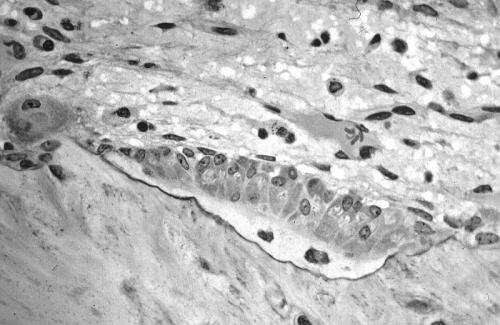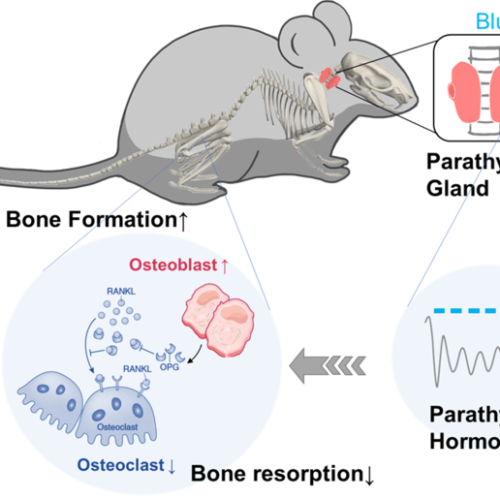Peer-Reviewed Publication Chongqing Medical University FacebookXLinkedInWeChatBlueskyMessageWhatsAppEmail image: NKD2 in BMSCs facilitated osteoblast differentiation and suppressed adipocyte formation in OVX mice. Representative images of immunohistochemical staining of ALP are shown (A). The number of osteoblasts was quantified (B). Representative images of hematoxylin and eosin staining are shown (C). The number (D) and area (E) of adipocytes were quantified. Representative images of immunohistochemical staining...
Tag: <span>bone loss</span>
Common thyroid medicine linked to bone loss
by Radiological Society of North America Bone density scan (DEXA scan). Credit: Radiological Society of North America (RSNA) and Elena Ghotbi, M.D. Levothyroxine, the second most commonly prescribed medication among older adults in the U.S., may be associated with bone loss, according to a study being presented at the annual meeting of the Radiological Society of North America...
Study suggests blackcurrant supplementation mitigates postmenopausal bone loss
September 17, 2024 by Anna Zarra Aldrich, University of Connecticut Credit: Wikimedia CommonsAs we age, our bones lose density and become more fragile, putting us in danger of breaks and fractures. This is especially a concern among post-menopausal women who generally have much greater losses in bone density than men in their age group. Ock...
Intervening to stop bone loss
by Katherine Unger Baillie, University of Pennsylvania Shuying (Sheri) Yang. Credit: University of Pennsylvania Bone remodeling in the body involves a balancing act between osteoblasts, cells that build bone, and osteoclasts, cells that break it down. Diseases such as osteoporosis, arthritis, and periodontitis involve bone loss, and are linked with an overabundance of osteoclast activity....
Levels of a certain hormone could predict or detect bone loss in premenopausal women
by University of California, Los Angeles Osteoblasts actively synthesizing osteoid. Credit: Robert M. Hunt; Wikipedia. Physicians may be able to determine if menopause-related bone loss is already in progress or about to begin by measuring the level of a hormone that declines as women approach their final menstrual period, new UCLA research finds. The findings...
Optogenetic control of parathyroid hormone secretion to prevent bone loss
CHINESE ACADEMY OF SCIENCES HEADQUARTERS IMAGE: OPTOGENETIC REGULATION OF PARATHYROID HORMONE SECRETION AND BONE LOSS CREDIT: SIAT Researchers led by Prof. YANG Fan from the Shenzhen Institute of Advanced Technology (SIAT) of the Chinese Academy of Sciences and their collaborators have proposed a new approach to control parathyroid hormone secretion in order to prevent secondary...
Are vascular calcification and bone loss linked disorders of aging?
INTERNATIONAL OSTEOPOROSIS FOUNDATION Vascular calcification, low bone mass, and fragility fractures are all frequent age-dependent disorders. Recent clinical and experimental data suggest that vascular calcification and bone loss could share pathophysiological mechanisms. A new review published by the International Osteoporosis Foundation (IOF) Working Group on Bone and Cardiovascular Diseases elucidates the numerous pathophysiological mechanisms shared by the...
WHY CANCER TREATMENT CAUSES BONE LOSS
EVANGELOU STRAIT-WUSTL Researchers studying mice have found a driver of bone loss related to cancer treatment. They’ve shown that radiation and chemotherapy can halt cell division in bone, which results in a stress response referred to as senescence. Bone loss that can lead to osteoporosis and fractures is a major problem for cancer patients who...
Study uncovers cause of bone loss in joint implant patients
Rutgers researchers have discovered the long-sought reason that many people with joint replacements experience harmful inflammation and bone loss. A major contributing factor to joint replacement failure is microparticles released from the prosthetic devices — known as “wear debris” — which are thought to promote inflammation, leading to pain, disappearance of bone tissue, loosening of...
UAB-led study shows drug effectiveness in reducing glucocorticoid-induced bone loss
The drug denosumab was superior to a commonly used drug in a 12-month study enrolling 795 patients UNIVERSITY OF ALABAMA AT BIRMINGHAM IMAGE: KEN SAAG BIRMINGHAM, Ala. – About one in every 100 people in the world takes glucocorticoids long term to treat immune-mediated diseases. However, glucocorticoids, such as prednisone, have a side effect — they...
- 1
- 2




